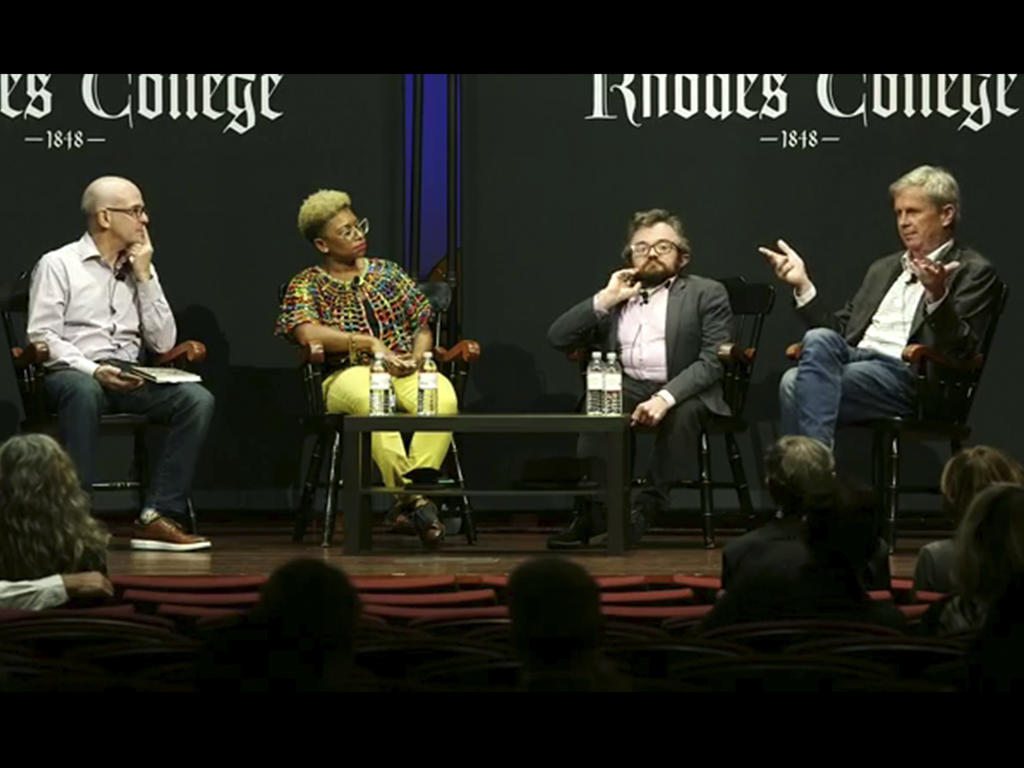To commemorate Memphis’ bicentennial, the Memphis Reads program gathered local writers, artists, and scholars to collaborate on the anthology Memphis: 200 Years Together. The 16 essays in the book chronicle the history, politics, sports, business, music, art, and food that have shaped the city. Co-edited by Dr. Jonathan Judaken, the Spence L. Wilson Chair in Humanities and professor of history at Rhodes, the anthology is a central part of this semester’s First-Year Experience, which includes the First-Year Seminar.
“Our goal in First-Year Seminar is for students to develop the skills and have the resources they need to thrive as scholars and as citizens at Rhodes, in Memphis, and in the world,” says Dr. Elizabeth Thomas, director of the seminar. “This book is the perfect gateway into that first-year experience—students can think about locating themselves in the multiple communities that make up Memphis and why it is so special that Rhodes is in this place.”
Memphis: 200 Years Together does not ignore the trials and tribulations that have long confronted the city, but instead shows how Memphis’ struggles and achievements have come to define the city, while also celebrating its diversity and dynamism. To further place them within their new community, first-year students complemented their reading with a guided tour of downtown Memphis to visit various historical landmarks and tourist sites.
On Sept. 19, Judaken, director of the Communities in Conversation lecture series at Rhodes, invited students, faculty, and members of the community to join the dialogue inspired by the anthology. A panel composed of Dr. Charles Hughes, director of the Lynne and Henry Turley Memphis Center and professor of history at Rhodes; Geoff Calkins, sports columnist for The Daily Memphian; and Dr. Zandria Robinson, author and sociologist, spoke to the idea of community and shared the personal stories and experiences that informed their work on the anthology.
In his essay, Calkins relays two pivotal sports moments in the city’s history and emphasized the possibilities of achieving unity through sports. He acknowledges how the Memphis Grizzlies, the city’s NBA team, has contributed to the re-identification of the city with its “grit and grind” attitude, and how the rebranding has inspired pride in the city by helping shake Memphis of its inferiority complex.
Robinson’s memoir-based piece calls readers to be mindful of Memphis’ non-dominant storylines. She uses memories held by her mother as a counternarrative to demonstrate that the experience of Memphis is different for its black and white citizens. and that stories can be problematic and obscure the realities of people who face violence and hardship in this city.
At Rhodes, Hughes teaches the course History, Race, Music, and the South and examines Memphis’ deep history through its dynamic music scene. “The Memphis sound is about confronting the challenges of the present. The sound is the history of black genius in the face of white violence, as is Memphis’ history,” says Hughes. During the Communities in Conversation event, Hughes explained that there are identifiable themes of community and cries for togetherness embedded into the structure of the Memphis sound. “Memphis music is about realizing that how we achieve actual togetherness, a legitimate kind of unity, is based on actual collaboration—not claims of collaboration masking white power structures and socioeconomic disparity—and is based on polyrhythm, not everyone playing the same thing.”
Judaken summarizes the book’s main take away: “All of us, at Rhodes, in Memphis, in America, have to think much more deeply about how our institutions are structured, who has power in those institutions, who has privilege, and how that can be transformed in ways that open us up to greater equality. Every individual’s story is a part of a legacy that makes up a community which is multiple and diversified, not one thing, and I hope every student is empowered to reach for their own stories and their families stories and figure out how it fits in to a broader community. Hopefully the book can be a touchstone for that.”
By Grace Merriman ’21
Watch a video of the panel discussion below.
